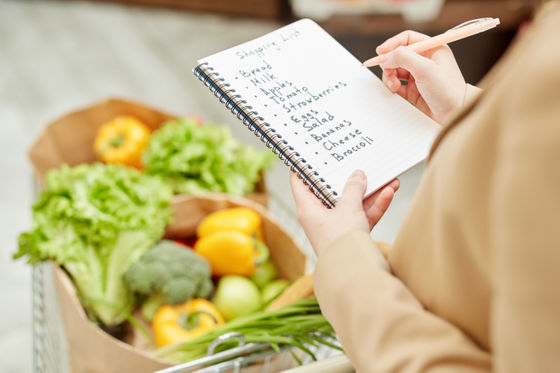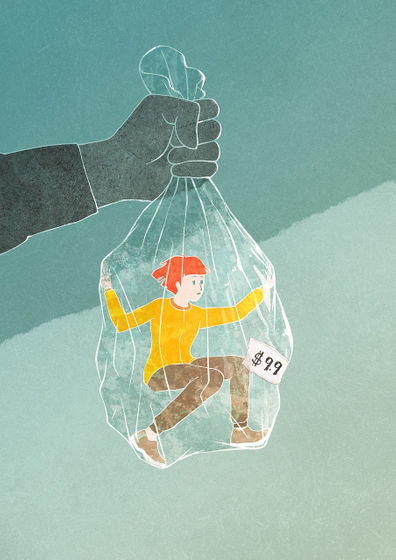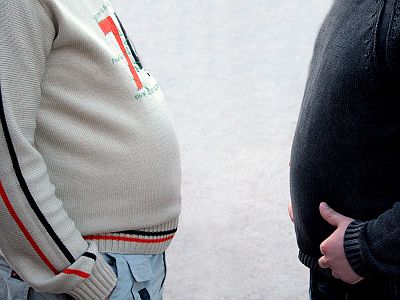14 ideas to save money by effortlessly eliminating 'impulse buying'

Even if you want to save money and save money, many people just make impulse purchases. That should be the case, and past research has revealed that
14 Tips to Stop Impulse Buying and Save Money | Money Girl
https://www.quickanddirtytips.com/money-finance/saving-spending/stop-impulse-buying
◆ 01: Make a shopping list
When you enter a store or access a mail-order site, you tend to buy extra things if you get caught up in what you've always wanted or complain about a big price cut. Therefore, if you make a note of what you need to buy in advance and concentrate on buying only that, you will not have to buy extra things.

◆ 02: Create a 'cooling period rule'
The 'cooling period rule' proposed by Mr. Adams is a rule that when you buy a large amount of money, you should wait for a while before actually buying it. The specific time varies from one hour to one month depending on the amount of money and personality of the individual, but the longer the time, the more 'wise choice' you can make. As a guide, one criterion is whether or not you can decide that you should buy it 24 hours after you decide to buy it.
As a way to put this into practice, Adams said, 'If you feel that this is necessary at the store, take a picture of the product once, go home, and go to the store again after a certain amount of time. , It would be good to look it up on a price comparison site based on the information in the photo. '
◆ 03: Try replacing the price with your own time
When you're about to buy something expensive, thinking 'how hard do you have to buy it?' Is one of the most effective ways to curb impulse purchases. .. For example, if a person with an hourly wage of 1,000 yen buys clothes for 10,000 yen, a simple calculation would mean that he would have to work hard for 10 hours. At this time, if you think, 'If you have to work for 10 hours ...', you should reconsider buying the clothes.
◆ 04: Do not buy items that cannot be returned
When you buy something on an auction site, you may come across a product that says, 'Returns are not possible at a reasonable price.' 'There's often a reason for something that didn't sell without an attractive price,' Adams said of such items. He said that you should be careful about products that cannot be returned, no matter how cheap they are.
◆ 05: Re-evaluate what you have
People who make impulse purchases tend to carry clothes packed in closets and items that are dusty in the storeroom. If you regularly double-check and keep track of what you already have, you won't have to worry about buying something similar.
'It was a lot of fun to organize the closets and kitchens according to the famous method of cleaning up consultant Marie Kondo . Please check her book' The Magic of Cleaning Up Life '.' I am.
14 ideas to save money by eliminating 'impulse buying' without difficulty --GIGAZINE

◆ 06: Planned luxury
As a result of putting up with impulse purchases, if you buy something expensive in reaction, it is the original Kiami. Therefore, Mr. Adams pools a small amount of money for luxury in advance, and if you set a time such as 'once a month' or 'once every three months' and degas regularly, it will be a big impulse purchase. I suggested that there would be no danger of spending money.
◆ 07: Take on the short-term 'Zero Extra Expenditure Challenge'
The 'zero extra spending challenge' proposed by Adams is 'do not buy new clothes for two months' and 'refrain from eating out for one month and cook for yourself'. It's best to always have no unnecessary spending, but it's a high hurdle to keep up with the uncertainties, so if you start by deciding on a period and creating a period with no extra spending, you'll get used to saving. I can do it.
'If it's too hard to get rid of all the extra spending, it's a good idea to squeeze into the categories that are causing the expense, such as'shoes'and'expensive cocktails',' Adams advised. doing.
◆ 08: Stop subscribing to the newsletter from the store
'If you don't see it, you won't touch it,' Adams said. When you receive an email with sales or new product launch information, you should click the 'Unsubscribe' link below before clicking on the product to cut off the temptation that leads directly to impulse purchases.
◆ 09: I only shop when my head is clean
Overseas, it is said that a therapy called 'shopping therapy ' is sometimes used to encourage shopping to deal with depression and stress.
You can read more about shopping therapy in the following articles:
What is the effect of 'shopping therapy' that makes you happy when you shop? --GIGAZINE

However, when stress causes physical and mental instability, normal judgment may be lost, which can lead to unexpected failures.
'There must be a way to relieve stress without spending anything. It's dangerous to be tired or hungry because it's logically unthinkable. Temporary shopping to boost your mood. Even if I feel better, I may fall into a vicious circle of being depressed because I bought it on impulse afterwards. ' He concluded that when he feels stressed or ill, he should not shop and cheer himself up by meeting friends, going for a walk, or taking a hot bath.
◆ 10: Do not make shopping an entertainment
People who enjoy window shopping are more likely to buy something because they are in the temptation to shop.
Regarding the dangers of shopping as entertainment, Adams said, 'If you don't want to make impulse purchases, even if you have the time, stay away from your favorite stores and shopping malls. When you don't have the budget, stay away. You should also stop shopping with friends who live a shopping-centric life. ' When buying something that is absolutely necessary, he says it is better to shop alone without friends or children.

◆ 11: Pay attention to low-rated reviews
Low-rated reviews are often exaggerated, so they usually don't get much attention. However, sometimes it makes you realize that you don't need to buy the product by pinpointing its shortcomings, so Adams said, 'The next time you want to buy something, a review of the product, especially a low-rated review. Let's turn our attention to. '
◆ 12: Minimize damage
If you make every effort to arrive at the store and can't help but buy something there, you can just buy the cheapest one and leave the store to minimize your spending. Also, in the case of online shopping, if you put the product in the cart without completing the order and then close the browser, you can get the satisfaction of 'shopping' without shopping.

◆ 13: Remember the shopping you regret
When you find a behavioral pattern that is likely to lead to an impulse purchase, or when you are discouraged at the moment when you are likely to make an impulse purchase, it is helpful to remember that you just bought something and regretted it.
◆ 14: Don't forget your goals
In the first place, 'refraining from impulse purchases' is not a purpose but a means, and the important thing is to save money for future goals. So remembering why you decided to stop impulse buying will keep you motivated.
'It's a good idea to write down your goals that made you want to stop impulse buying and keep them in a conspicuous place. For example, put sticky notes or laminated cards with your goals in your fridge or work desk. It is effective to stick it on a mirror in the bathroom or set it on the standby screen of a smartphone or the screen saver of a PC. '
Related Posts:
in Note, Posted by log1l_ks







